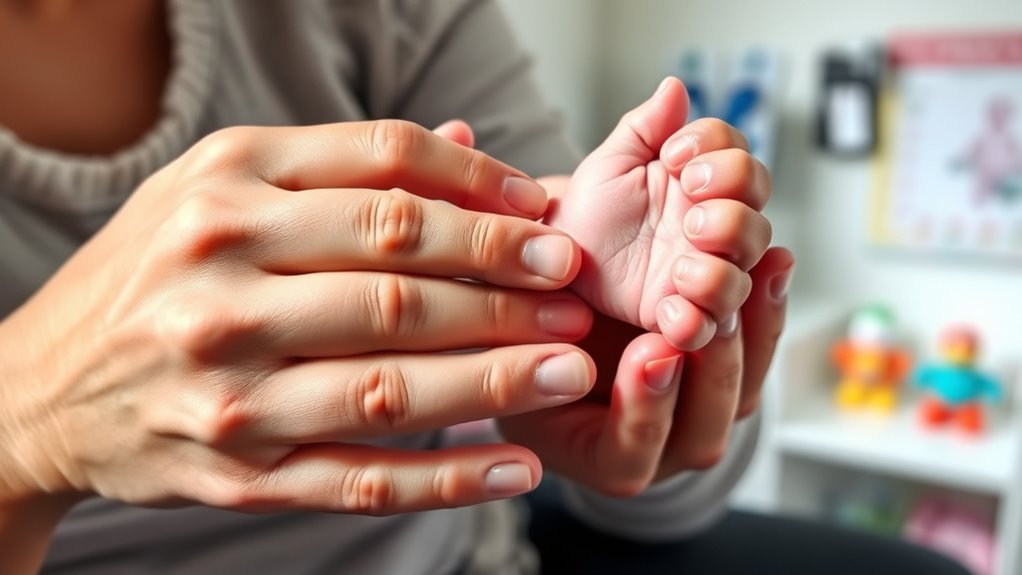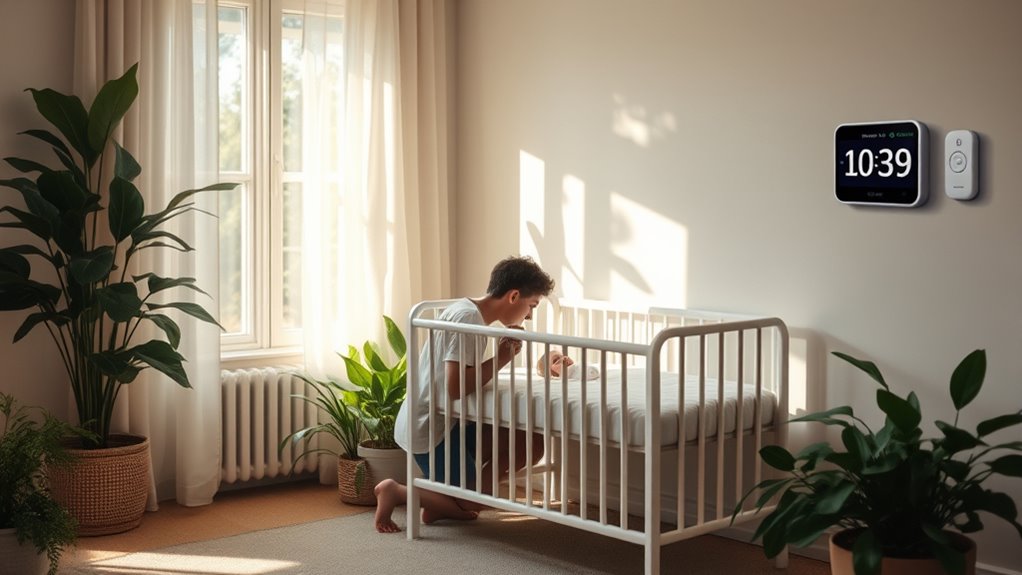If you notice developmental delays like trouble rolling, sitting, or speaking, it’s essential to seek help. Watch for physical growth issues such as limited movement or unusual posture. Behavioral concerns, including persistent crying or aggressive behavior, can signal a need for consultation. Also, be aware of common medical conditions and environmental hazards that may affect your baby’s health. Nurturing their development is key, and there’s more to explore to guarantee your child’s well-being.
Key Takeaways
- Seek medical attention if your baby shows delayed motor skills, such as not rolling over or sitting by expected milestones.
- Consult a pediatrician if your baby struggles with speech or understanding words, indicating potential developmental delays.
- Watch for persistent behavioral concerns like inconsolable crying, aggression, or settling difficulties that may require professional evaluation.
- Monitor for physical growth issues, such as limited movement or unusual posture, and discuss any concerns during regular check-ups.
- Trust your instincts about your baby’s health; seek medical advice for any sudden changes in behavior or signs of illness.

Guide & Grow: Baby's 1st Year: A Monthly Guide to Development, Milestones and Activities to Support Baby's Development
As an affiliate, we earn on qualifying purchases.
As an affiliate, we earn on qualifying purchases.
Signs of Developmental Delays

While every child develops at their own pace, there are certain signs of developmental delays that parents should watch for.
If your child struggles with rolling, sitting, crawling, or walking, it may indicate motor skill issues. Fine motor difficulties can arise when handling small objects.
Additionally, speech delays or challenges in understanding words often signal developmental concerns. You might notice impaired problem-solving skills or difficulties understanding cause and effect as well.
Speech delays and difficulties with understanding words can indicate important developmental concerns that deserve attention.
Social skills can be affected too; if your child has trouble interacting or communicating, it’s worth noting. Be vigilant for frequent tantrums, withdrawal from social interactions, or a lack of curiosity about their environment.
Recognizing these signs early can lead to timely intervention and support.

Imitation Book: Interactive & Fun Learn to Talk Board Book For Toddlers Ages 0-4, Written by a Speech Therapist
Learning to talk
As an affiliate, we earn on qualifying purchases.
As an affiliate, we earn on qualifying purchases.
Indicators of Physical Growth Issues

Physical growth issues can be concerning for parents, as they may affect a child’s overall development.
Look for limited arm and leg movement; if your baby can’t lift their head or shows stiffness, it may indicate muscle tone problems. Delayed motor skills, like rolling or sitting, can also be a red flag. By six months, babies should support their weight with assistance—reluctance here might signal developmental issues.
Monitor for unusual posture or favoring one side, as consistent asymmetry may suggest underlying problems. Finally, verify your baby is getting adequate nutrition, as deficiencies can hinder growth.
Regular check-ups and growth charts are essential for tracking these indicators and verifying your baby’s healthy development.

How Big Is Our Baby Fetal Growth Chart Poster Baby Growth Poster style 12x18inch(30x45cm)
👑Poster gets 0.6-2,4cm more widely incase to protection.The new frameless wall art poster print is made of durable,…
As an affiliate, we earn on qualifying purchases.
As an affiliate, we earn on qualifying purchases.
Understanding Behavioral Concerns

As you navigate the early stages of your baby’s life, understanding behavioral concerns can help you differentiate between typical development and signs that may need attention.
It’s common for infants to cry or be fussy, but prolonged inconsolable crying or sudden behavioral changes should raise a red flag. Familiarizing yourself with developmental milestones allows you to set realistic expectations, especially regarding tantrums in toddlers.
Prolonged inconsolable crying or sudden changes in behavior may indicate a need for further evaluation.
If you notice persistent difficulties settling or any aggressive behavior, it’s essential to consult a pediatrician. They can provide valuable insights and determine if further evaluation is necessary. Additionally, be mindful of your baby’s sleep patterns, as disruptions in sleep can also affect behavior.
Keeping detailed records of your baby’s behavior will also aid in discussions with healthcare providers, ensuring you get the support needed for your child’s development.

Sassy Stacks of Circles Stacking Ring STEM Learning Toy, Age 6+ Months, Multi, 9 Piece Set
Straight post accepts different sized rings, strengthening hand-eye coordination
As an affiliate, we earn on qualifying purchases.
As an affiliate, we earn on qualifying purchases.
Recognizing Medical Conditions

Recognizing medical conditions in your baby is essential for guaranteeing their health and well-being.
Watch for common respiratory infections like RSV, which can cause cough and congestion. If your baby has a barking cough or difficulty breathing, it might be croup.
Ear infections often present as fussiness and ear pulling. Skin conditions, such as diaper rash or eczema, require proper care to prevent complications.
Gastrointestinal issues, including colic or persistent vomiting, may indicate a need for medical attention. Pay close attention to fevers, especially if they’re accompanied by other symptoms.
Always trust your instincts; if something feels off, consult your pediatrician to guarantee your baby receives the care they need.
Environmental Hazards to Monitor

While most parents focus on immediate health concerns, it’s equally important to be aware of environmental hazards that can impact your baby’s development.
Air pollution, especially from vehicle emissions, can lead to asthma and respiratory issues. Indoor air contaminants like secondhand smoke and chemicals pose additional risks.
Air pollution and indoor contaminants significantly increase the risk of asthma and respiratory problems in children.
Water quality is vital; inadequate water and poor sanitation can lead to gastrointestinal diseases. Be mindful of chemicals in your home, such as flame retardants and household cleaners, which can affect your child’s cognitive development.
Additionally, make sure your baby’s play areas are safe and free from pests and mold. By monitoring these hazards, you can help create a healthier environment for your child to thrive.
Frequently Asked Questions
What Age Milestones Should I Expect for My Baby?
You can expect several exciting milestones for your baby in their first year.
By three months, they’ll start grabbing objects and recognizing familiar voices.
Around six months, they’ll sit without support and begin babbling.
By nine months, they’ll master sitting up and might start crawling.
Finally, by twelve months, they’ll likely stand with support, wave goodbye, and say simple words like “mama” or “dada.”
Enjoy these precious moments as they grow!
How Can I Encourage My Baby’S Language Development?
To encourage your baby’s language development, engage in interactive communication by talking and responding to their sounds.
Use “motherese” to capture their attention, and read aloud to expose them to new words.
Play games like peek-a-boo to promote interaction and encourage gestures like waving.
Imitate their babbles to foster expressive communication.
Surround your baby with rich auditory experiences, as consistent exposure is key to helping them develop their language skills effectively.
What Are Typical Sleep Patterns for Infants?
When it comes to your baby’s sleep patterns, it’s a whole new ball game!
Newborns typically sleep 16 to 19 hours daily, with cycles lasting 20 to 50 minutes. As they grow, by 3-6 months, they’ll sleep around 12-15 hours, taking 2-3 naps.
By 6-12 months, expect 11-14 hours of sleep, mostly at night.
When Should I Introduce Solid Foods to My Baby?
You should introduce solid foods to your baby between 4 to 6 months, when they show signs of readiness.
Look for cues like sitting up, controlling their head, and showing interest in food.
Starting solids around 6 months aligns with many health guidelines, ensuring your baby gets essential nutrients.
Remember to introduce a variety of textures and flavors while avoiding choking hazards.
Enjoy this exciting milestone in your baby’s development!
How Can I Support My Baby’s Social Skills?
To support your baby’s social skills, engage in playful activities like peek-a-boo and respond to their coos and smiles.
Use facial expressions to mimic and connect, fostering their social awareness. Hold and cuddle them to build trust, and maintain consistent communication to help them understand social cues.
Reading stories and singing songs can also promote bonding, while exposing them to different environments stimulates their social interest.
Always encourage their gestures for better communication!
Conclusion
To sum up, staying vigilant about your baby’s development is essential. Did you know that about 1 in 6 children experience developmental delays? By recognizing signs of developmental delays, physical growth issues, or behavioral concerns early on, you can seek medical attention promptly. Keeping an eye on environmental hazards is just as important. Trust your instincts—if you’re worried, don’t hesitate to reach out to your pediatrician. Your baby’s health and happiness depend on it!









